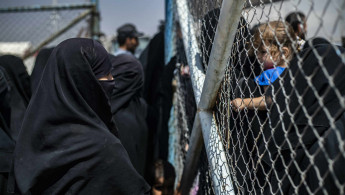Around 200 displaced Syrians leave overcrowded al-Hol refugee camp
Syria's Kurds, after years of fighting the Islamic State group, are holding tens of thousands of civilians and IS relatives in camps for the displaced.
In June, they started sending home Syrian families that had fled their homes during battles against the jihadists from the overpopulated camp of al-Hol.
A Kurdish official said around 200 people were leaving the camp on Sunday, to head back to their villages in the eastern province of Deir az-Zour.
"Most are women and children, with just some men," said Sheikhmous Ahmad, a Kurdish official in charge of the displaced.
The majority were civilians with no ties to IS, he said, while a few might have aligned with the jihadists but today regretted their decision.
The group was headed back to the villages of Hajin, Shaafa or Baghouz, which were the last to be held by IS before US-backed fighters expelled them from the entire area in March.
Ahmad said around 300 people from Al-Hol had already been taken back to the same area last week.
Previously, evacuations had been put on hold after Turkish troops and their Syrian proxies on October 9 launched a blistering military operation against Kurdish forces.
In June, several hundred women and children had returned to the towns of Raqqa - once the de-facto IS capital in Syria - and Tabqa, both located in the northern province of Raqqa.
That area was taken by Kurdish-led forces from IS in October 2017.
The United Nations said the Al-Hol camp's population last month stood at around 70,000 people.
These included more than 30,000 Iraqis, some 28,000 Syrians and over 10,000 foreign nationals - many of them relatives of alleged jihadist fighters being held in detention.
The Kurdish authorities have repeatedly called on Western nations to repatriate their nationals, but they have been largely reluctant, except in a handful of cases.
Abysmal conditions
Last month, the International Rescue Committee (IRC) reported hundreds of children have died at the tent camp for the wives and children of suspected Islamic State group fighters.
Data from the humanitarian group shows that 339 children lost their lives due to disease and other conditions between December 2018 and September 2019 at al-Hol camp.
The number of children aged-under-five who had died at the camp has doubled since March this year, owing at least in part to the terrible conditionsm the IRC added.
Also read: Baghdadi urges followers to 'rescue' jailed jihadists and families
The report calls life a "purgatory-like existence" for the 70,000 currently living there, the vast majority of whom are women and children.
There are 7,000 children who are the progeny of foreign nationals, due to their parents' suspected membership of IS.
The appalling conditions have led to 406 recorded deaths, 339 of whom - over 80 percent - were children.
The IRC's report states that over a third of these deaths took place in tents, where children have no access to health facilities and the majority of cases are preventable.
It said the main causes of child deaths are severe malnutrition with complications and diarrhoea with dehydration and pneumonia - an indicator of the abysmal health conditions and the lack of humanitarian assistance.
The foreign section of the camp called the Annex is reportedly the worst part to live in, with few health services available despite the general improvement of the rest of the camp.
Residents here face extreme restrictions on their movement, with women sometimes forced to give birth alone in their tents.
The IRC fears that a "narrative of 'radicalisation' is hindering humanitarian access and the impartial delivery of aid to all those in need - including foreign women and children".
A third of all reported deaths of children in the camp occurred in the Annex.
Misty Buswell, Middle East Policy, Advocacy and Communications Director at the IRC urged the international community to "scale up" humanitarian services at al-Hol camp, and advocated for the repatriation of the children of foreign nationals.
"The tragic increase in child deaths underscores the need for countries of origin to repatriate these children and ensure that they don’t become stateless, and for the international community to take the necessary steps to ensure the safety and wellbeing of these innocent victims of the conflict."
The Islamic State group captured large swathes of Iraq and Syria in 2014, fighting to carve out their own 'caliphate'.
The Syrian war began in 2011 after peaceful demonstrations against President Bashar al-Assad were brutally suppressed. Around 500,000 people have reportedly been killed in the war.
Follow us on Twitter and Instagram to stay connected





 Follow the Middle East's top stories in English at The New Arab on Google News
Follow the Middle East's top stories in English at The New Arab on Google News
![Both Hamas and the Palestinian Authority welcomed the ICC arrest warrants [Getty]](/sites/default/files/styles/image_330x185/public/2024-11/GettyImages-2178351173.jpg?h=199d8c1f&itok=TV858iVg)

